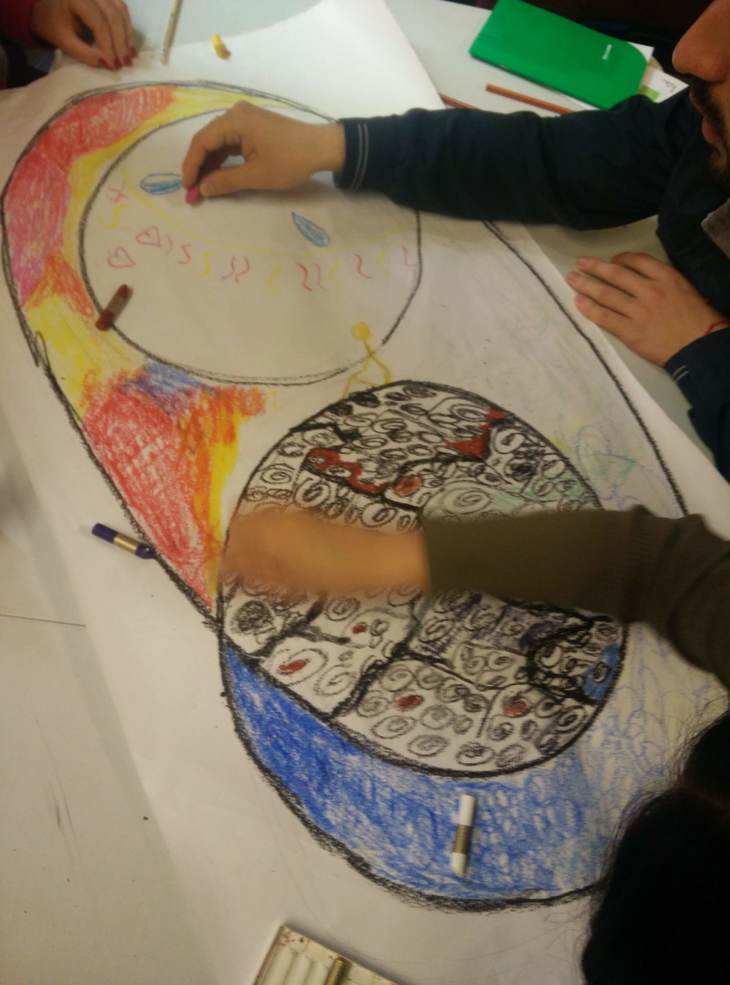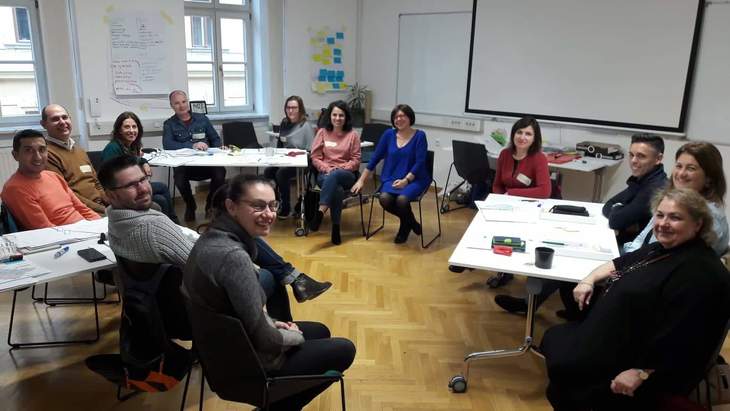
A well-designed mobility project can contribute to the implementation of an organizational strategy. This was also the case with the adult education initiative of Antener Education Organizer Ltd., which enabled sixteen participants to learn and adapt training methods abroad. We spoke to Tímea Piroska, the coordinator of the project.
Thinking strategically in the age of coronavirus – Antener's adult education mobility project
Trainers in Europe – knowledge at home
"The basic aim of the Trainers in Europe project was to enable our trainer colleagues who work for us get to learn about good practices of other training institutions. Our colleagues have been to Malta, the UK, Spain, Italy, Slovenia, Croatia, and Slovakia," said project coordinator Tímea Piroska.
A key criterion in the selection of the courses visited during the project was to cover different topics and to cover the methods identified as gaps in Antener's strategic planning. Accordingly, a range of topics from intercultural communication to conflict management, emotional intelligence and mindfulness were covered.
"The most exciting method we learned was in England, where we took part in a training session on a growth mindset. The methodology is mainly used with children, so it was remarkably interesting to see how we can incorporate this approach into adult education," as Tímea shared her experience. “The aim of the method is to override the fixed approach of the participants. For example, when I'm convinced that I am not good at math and therefore will never be good at it. This thought completely excludes the possibility that I can make progress investing energy and learning. With a growth mindset, we override this extreme attitude by focusing on progress rather than performance, rather than 'sense'."
There are both advantages and disadvantages to having participated in such a wide range of training throughout the project. On the one hand, it required a lot more follow up work to systematize the methods acquired. On the other hand, the mix of different methods resulted in exciting training packages. The knowledge and experience gained during the project was compiled in a manual.
"In our publication entitled The Trainer’s Big Book – A Collection of Methodological Ideas, we summarized the training games and exercises collected by colleagues during their training abroad. We have also compiled some classic training exercises, for example, a complete conflict management training is also included in the methodological handbook."
International opportunities – organizational and personal development
 Antener has undergone great development in recent years: while in 2018 only 20 junior trainers joined them, in 2020 there were already 100.The organization’s trainer profile makes it a priority to participate in international projects and make this opportunity available to its trainers.
Antener has undergone great development in recent years: while in 2018 only 20 junior trainers joined them, in 2020 there were already 100.The organization’s trainer profile makes it a priority to participate in international projects and make this opportunity available to its trainers.
"A lot of people want to travel, so we had to develop a set of criteria to select participants. After all, I can’t just say I'll let someone participate and not let someone else go, just because they don’t fit in the budget. This set of criteria is very objective, it measures things such as the applicant's language skills, motivation and how they will pass on and disseminate what they learned. For example, do they plan to write an article or take advanced training courses? In this way, we can also motivate our own trainers to constantly innovate and improve."
Of course, experience abroad must also be incorporated into the life of the organization.
"I think the greatest value of the Erasmus+ programme is that you can gain experience and learn about methods abroad. It allows us to pass on first-hand competencies or skills to our own community at home that they might not be able to acquire otherwise," Tímea Piroska continued. "In general, with this type of mobility project, we have two objectives. On the one hand, it is to provide colleagues with experiences, training elements, exercises, and methodologies that they can incorporate into their own training. On the other hand, to broaden the range of Antener’s trainings. In this way, prospective trainers will acquire international knowledge right here at home. This is our competitive advantage; this is how we can operate."
Thinking strategically in the age of the corona virus
Tímea also shared how she has grown through Erasmus projects and what advice she has for others.
"Before anyone starts applying, they need to consider whether they are able to think in project terms. It's not difficult, but I'm a humanities major, it wasn’t easy for me. It took me one or two application cycles to know how to design these projects to be effective."
Tímea emphasized that the most important thing is to have specific goals in accordance with our organizational strategy and to develop a kind of resilience, so we can approach possible changes and unexpected turns. In such a situation, it helps to see where we start, what we would like to achieve, what milestones the project has and what indicators we want to measure its success against. In this way, potential challenges can be overcome without compromising the original goals of the project. This approach was also needed during the project: due to the coronavirus pandemic, it had to be reworked several times.
 "This project came at a very difficult time. We had a few trips abroad and then the pandemic came right away. A lot of things had to be reorganized. We did not want to implement the activities online, as online training methods were still in their infancy at that time. The biggest challenge was that we had our goals there and we had to figure out how to achieve them in the changed situation. First, we changed the length of the project to 24 and then to 36 months from the originally planned 16. In the meantime, the company we would have visited ceased to exist, or the course did not start, even if it was possible to travel. A lot of times it had to be redesigned, an institution or a course had to be changed, all in such a way as to achieve the original goals. It was one of the most difficult projects of the recent period but seeing the goal to which our methods and tools had to be adapted helped to implement it."
"This project came at a very difficult time. We had a few trips abroad and then the pandemic came right away. A lot of things had to be reorganized. We did not want to implement the activities online, as online training methods were still in their infancy at that time. The biggest challenge was that we had our goals there and we had to figure out how to achieve them in the changed situation. First, we changed the length of the project to 24 and then to 36 months from the originally planned 16. In the meantime, the company we would have visited ceased to exist, or the course did not start, even if it was possible to travel. A lot of times it had to be redesigned, an institution or a course had to be changed, all in such a way as to achieve the original goals. It was one of the most difficult projects of the recent period but seeing the goal to which our methods and tools had to be adapted helped to implement it."
Accreditation provides additional opportunities. What are the future plans of the award-winning organization?
"We want to continue applying. We are immensely proud to have been awarded of the Erasmus accreditation in the field of adult education, so that we can continuously support colleagues in mobility activities over the next five years. We would also like to participate in partnerships for cooperation. We have less experience in this area, we think it is a bit more difficult, but I think that with a well-conceived project idea and well-selected partners, we can still achieve success there," concluded Tímea.
|
Values of the project: The aim of the Trainers in Europe project was that the mobility participants, the organization, and the domestic audience could benefit from the training methods learned abroad. During the courses, participants were able to learn about niche areas that fit into the strategic planning of the organization. The main strength of the project is that all its activities were carried out purposefully and thoughtfully. Thus, they were able to achieve high-quality learning outcomes at the participant level, and at the institutional level, the goals set could be achieved despite the coronavirus pandemic. During the project, a methodological collection of ideas with more than one hundred tasks was also compiled. Organization: Antener Education Organizer Ltd. |
Agnes Hargitai | Communication Officer
Tempus Public Foundation | Erasmus+ Programme Directorate
Last modified: 21-11-2022















